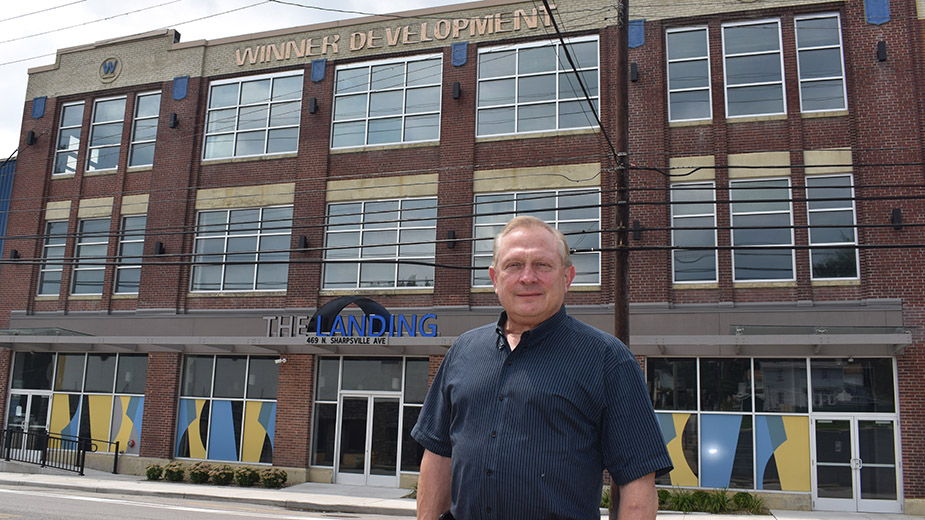SHARON, Pa. – Jack Campbell of the Winner Companies is optimistic about the impact that an aquaponics operation could have on The Landing in Sharon, Pa.
The Landing is a multitenant space in the former Westinghouse Electric Corp. complex that offers office and manufacturing/warehousing space. It’s operated by Valley Shenango Economic Development Corp.
The Winner Companies, which purchased the former Westinghouse site in the 1990s, entered into a master lease agreement a few years ago with VSEDC for about half of the complex.
Of the 250,000 square feet of available industrial space, about half is being used for warehousing tenants or by Winner Water Services, a Winner Companies subsidiary that is developing technology to extract rare earth minerals from coal ash such as those used in electronics.
About a fifth of the 250,000 square feet of office space is being used by existing tenants or allocated for the planned aquaponics operation, which work will begin on soon. Equipment for the aquaponics center arrived in early August, says Campbell, vice president and secretary of the Winner Companies.
“Within a few weeks we expect to select a contractor and will try to jump into getting things rolling fairly quickly,” he says.
The aquaponics facility would have both educational and commercial components. Penn State University has an interest in expanding the course structure at the Shenango Campus to include more agriculture-related courses, Campbell says.
The education center will focus on community outreach with a niche in agricultural business, says Jo Anne Carrick, Penn State Shenango campus director. Many people aren’t aware that Penn State started in the 1860s as a land-grant college for agriculture, she notes.
Controlled environment agriculture techniques such as aquaponics, hydroponics and aeroponics extend the farming calendar, Carrick says.
“Because farming is always dependent on the weather, doing a controlled environment can extend that farming calendar to when it’s snowing,” she says.
The space offers multiple opportunities for Penn State Shenango, she points out. A chemistry professor at the branch has a specialty in sustainability and water availability, and the space provides potential for undergraduate research.
“We offer a four-year degree in business but here is a minor in agriculture business that we could offer course work in though our network at Penn State,” Carrick says. There also are opportunities through the Invent Penn State entrepreneurship initiative and programs at the eCenter@LindenPointe.
The 25,000 square feet of space could produce more than 100,000 heads of lettuce each year and 6,000 pounds of fresh fish, all done without pesticides and using less water than traditional farming, Campbell says. In addition, aquaponics extends the growing year for products, and isn’t limited to growing leafy products.
Locally grown items would have a seven-day freshness advantage over products that have to be trucked here from California or Mexico. “You can supply to local restaurants and stores from within a day,” Campbell says.
“If we’re downstairs selling lettuce and fish or whatever, it may get someone else interested in setting up their jelly company. Or somebody may want to open up a fresh meat market, or sell other types of produce,” he says.
Campbell says he is in discussions with an indoor farming company that is interested in taking most of the industrial space to use for urban agriculture. A feasibility study is being conducted to determine whether the space at The Landing is suitable, he says.
The entrepreneur already is developing a similar project in Pittsburgh and is looking at branches in Cleveland and Erie. The proposed center at The Landing would supply fish to the other locations and potentially be used for growing products such as mushrooms in the building’s lower levels.
One of the unanticipated aspects of the project was having to run additional power into the building.
The former Westinghouse property has a powerhouse on site that was sold along with the former Winner Steel operation – now Sharon Coating – more than a decade ago.
“We thought we had brought sufficient power in the building a couple years ago,” Campbell says. That additional power would be completely consumed by the power demands of the aquaponics infrastructure, necessitating additional power.
An application for a $900,000 Appalachian Regional Commission grant that The Landing and Penn State Shenango sought for a marketplace and food lab to operate in conjunction with the aquaponics space recently was rejected. But the partners aren’t giving up.
“There are other grants that are available,” Campbell says.
Meanwhile, the public is starting to recognize potential uses of The Landing. Several local groups have used a community meeting room in the renovated lobby.
Seeing the space hopefully will inspire people coming to the building “to see what level it could be renovated to,” Campbell says.
TNF Design Co., a sign-making company, is among the new tenants, having moved in in March.
Owner Taylor Froetschel started TNF Design in October when she used wood left over from adding a deck at her house to make seasonal items for fall. She later added Christmas items and the business grew from there, taking over her garage, the basement and eventually the dining room.
“So far it’s good,” she says of her move into The Landing, where she has about 1,800 square feet of space.
TNF sells nationally through the internet and she is considering adding a physical storefront in the next year or so.
Pictured: Jack Campbell, vice president and secretary at the Winner Companies, stands in front of the entrance to The Landing.
